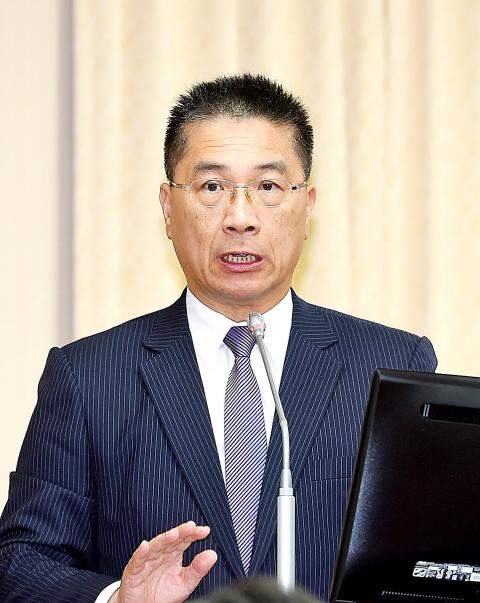The format of Alien Residency Certificate (ARC) numbers is to be changed to bring them in line with the Republic of China identification card format, the Ministry of the Interior said yesterday.
The measure is part of the government’s ongoing effort to boost the nation’s competitiveness by attracting and keeping international talent.
ARCs are currently assigned a number consisting of two letters and an eight-digit number, while Taiwanese citizens have an ID number consisting of one letter and a nine-digit number.

Photo: Fang pin-chao, Taipei Times
In an interview with Taiwan Business Topics, a monthly magazine published by the American Chamber of Commerce in Taipei, Minister of the Interior Hsu Kuo-yung (徐國勇) said that the measure would increase foreign residents’ sense of belonging in Taiwan and make their lives easier.
Having a residency number with the same format as a national ID card number would make online shopping, booking tickets, hospital visits and other activities easier for foreigners, Hsu said.
“The ministry sincerely welcomes foreign nationals to Taiwan,” he said.
The ministry is in the process of communicating with other agencies and businesses to ensure a smooth transition following the plan’s implementation and hopes to launch the new measure soon, he said.
The measure would be a major change and a milestone in Taiwan’s policy on foreign residency and is not offered by many nations, the ministry said.
With the same format as national ID cards, ARC holders would be able to enjoy semi-citizen treatment in many areas of their daily lives, it said.

US President Donald Trump yesterday announced sweeping "reciprocal tariffs" on US trading partners, including a 32 percent tax on goods from Taiwan that is set to take effect on Wednesday. At a Rose Garden event, Trump declared a 10 percent baseline tax on imports from all countries, with the White House saying it would take effect on Saturday. Countries with larger trade surpluses with the US would face higher duties beginning on Wednesday, including Taiwan (32 percent), China (34 percent), Japan (24 percent), South Korea (25 percent), Vietnam (46 percent) and Thailand (36 percent). Canada and Mexico, the two largest US trading

AIR SUPPORT: The Ministry of National Defense thanked the US for the delivery, adding that it was an indicator of the White House’s commitment to the Taiwan Relations Act Deputy Minister of National Defense Po Horng-huei (柏鴻輝) and Representative to the US Alexander Yui on Friday attended a delivery ceremony for the first of Taiwan’s long-awaited 66 F-16C/D Block 70 jets at a Lockheed Martin Corp factory in Greenville, South Carolina. “We are so proud to be the global home of the F-16 and to support Taiwan’s air defense capabilities,” US Representative William Timmons wrote on X, alongside a photograph of Taiwanese and US officials at the event. The F-16C/D Block 70 jets Taiwan ordered have the same capabilities as aircraft that had been upgraded to F-16Vs. The batch of Lockheed Martin

China's military today said it began joint army, navy and rocket force exercises around Taiwan to "serve as a stern warning and powerful deterrent against Taiwanese independence," calling President William Lai (賴清德) a "parasite." The exercises come after Lai called Beijing a "foreign hostile force" last month. More than 10 Chinese military ships approached close to Taiwan's 24 nautical mile (44.4km) contiguous zone this morning and Taiwan sent its own warships to respond, two senior Taiwanese officials said. Taiwan has not yet detected any live fire by the Chinese military so far, one of the officials said. The drills took place after US Secretary

THUGGISH BEHAVIOR: Encouraging people to report independence supporters is another intimidation tactic that threatens cross-strait peace, the state department said China setting up an online system for reporting “Taiwanese independence” advocates is an “irresponsible and reprehensible” act, a US government spokesperson said on Friday. “China’s call for private individuals to report on alleged ‘persecution or suppression’ by supposed ‘Taiwan independence henchmen and accomplices’ is irresponsible and reprehensible,” an unnamed US Department of State spokesperson told the Central News Agency in an e-mail. The move is part of Beijing’s “intimidation campaign” against Taiwan and its supporters, and is “threatening free speech around the world, destabilizing the Indo-Pacific region, and deliberately eroding the cross-strait status quo,” the spokesperson said. The Chinese Communist Party’s “threats